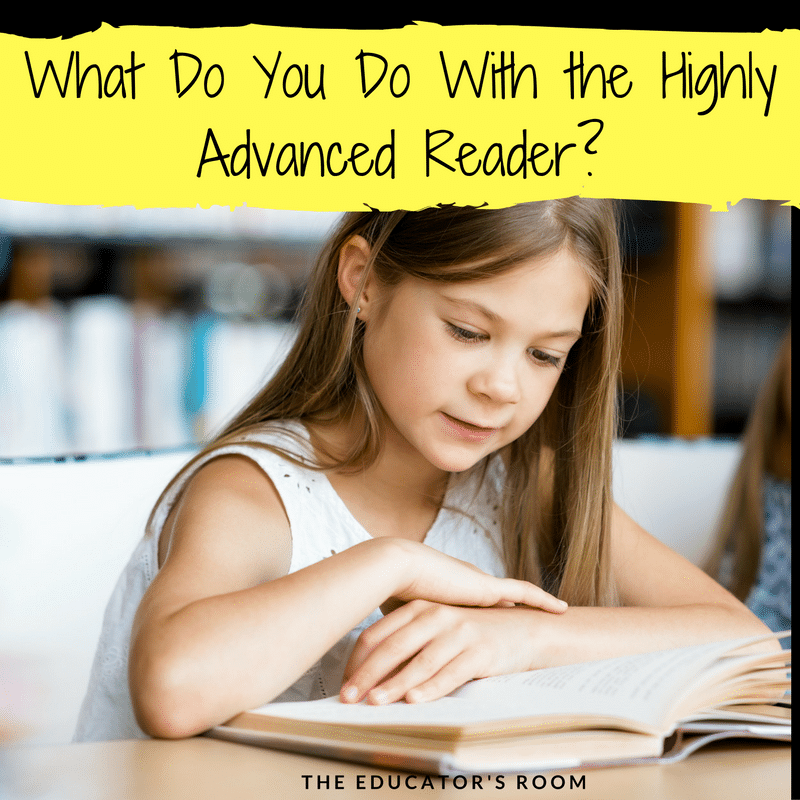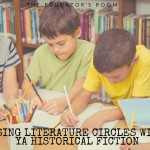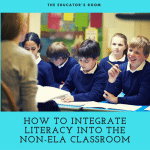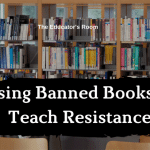As a teacher of gifted students, I’ve come to expect the unexpected. Most students demonstrate asynchronous development. Others are bright but underachieving. Still, other students are not truly gifted, but are bright “teacher pleasers,” with the sort of behaviors that make teachers lives easier. What I did not expect was to find three students in one class who were literally off the charts as readers. When attempting to find their guided reading level using the Fountas and Pinnell Benchmark Assessment System (BAS), I could not. All three eventually came out independent at a level Z, the highest level possible with the BAS. Having three such students challenged me as a teacher, and made me focus intently on differentiation. However, as difficult as it was to have three such students, having only one, two years later, proved even more difficult. While not all teachers will find themselves with such precocity every year, most teachers will eventually find themselves with one student who is truly a group of their own. Here is how to help the highly advanced reader:
Confirm the data
The first step to working with a highly advanced reader is to confirm that they really are that advanced. Some students are excellent test-takers, and can test at a higher level than their real reading level. Confirm their reading level by conversing with them about their current reading, checking any records you have about them, and when available, communicate with a previous teacher. In other words, don’t take a single assessment as being truly representative of a student’s reading ability.
Find their interests
While this is important for all students, this is especially important with the highly advanced reader. In the case of my third graders who were at or above an eighth grade reading level, many of the books written at their level were written with high schoolers in mind, not young preteens. Helping them craft a reading list which will challenge them while avoiding titles they are not emotionally mature enough to handle can be a delicate balance. As one parent told me, “I want her to grow, but I also want her to be an eight year old.” When in doubt, look for classic children’s literature. Many such books, such as The Wind in the Willows, by Kenneth Grahame, are written with young children in mind, but with vocabulary and literary complexity typically associated with older readers. Modern young adult novels may also be appropriate, but caution should always be exercised with these books. The sooner than you find their interests, the sooner you can help them find appropriate books for themselves. Like all readers, it is important that they be encouraged to read books that they will find challenging but approachable.
Do not put them in a group just to put them in a group…
This may be controversial with your school. Some schools set an expectation that all students will participate in a guided reading group. Putting your highly advanced readers in a regular guided reading group with students reading multiple grade levels lower than them will be of limited value to them. Be selective about adding them to a guided reading group. Even a gifted reader will have areas to improve, so consider using skill-based groups, rather than level-based groups. If you must use level-based groups, add your gifted reader to a group when you will be focusing on a skill they need to improve.
But don’t leave them alone
One common refrain I hear from classroom teachers is that they seldom meet with their gifted readers, either because “they don’t need it” or “other kids need it more.” The first statement, in particular, is problematic. Any young reader, even a gifted reader, needs guidance in order to improve. Simply giving them a book to read may keep them happy and engaged, but it will not give them the skills they need to become even better readers. While your gifted reader does not need you the same way that your students reading multiple years below grade level do, they still need guidance.
Different work, not more work
This is the biggest struggle teachers have working with gifted students. No matter what method of enrichment you choose to do with your advanced reader, it should be in place of something, not in addition to all other work. If students are held accountable for all the work their classmates are, in addition to the enrichment work you have designed for them, it will quickly seem to them like a punishment, rather than enrichment.
So, what do you do?
Student Driven Independent Reading- One approach to consider with your gifted students is the Schoolwide Enhanced Model Reading (SEM-R) approach. With this approach, your student would be able to read books of their own interest at their own level, while you check in with them on a regularly scheduled basis. Instead of formal guided reading, you would engage in regular reading conferences with this student based on their own independent reading. The SEM-R approach, while designed with whole classes of gifted readers in mind, is flexible enough to be used with individual students or a small group of students as needed. This site provides a variety of resources helpful for implementing the SEM-R approach, including the bookmarks which are the focus of the reading conferences you hold with student. In as little as ten minutes a week of 1-on-1 time with your gifted student, you will quickly see them become even stronger readers, and will enjoy the work.
Novel Study- This is not the same as independent reading. For a novel study, you and the student together should choose a book, and design a plan for working through the book. While the student is reading, they can do a variety of activities, depending on their focus. Students should have pre-determined stopping points, and dates that they will meet with you to discuss the book.
Literature Circle- This is similar to a novel study, except with other students instead of a teacher. While you may have only one or two highly advanced readers, your grade level may have others. If you can put these students together, they can assign roles, engage in discussion, and work on a variety of skills. This would also be an excellent addition to your guided reading with on grade level readers.
As a teacher, your gifted readers need you just as much as the other students in the class, they just need you in a different way from their classmates. Whatever you choose to do to help enrich their learning, the first consideration should always be student interest.







